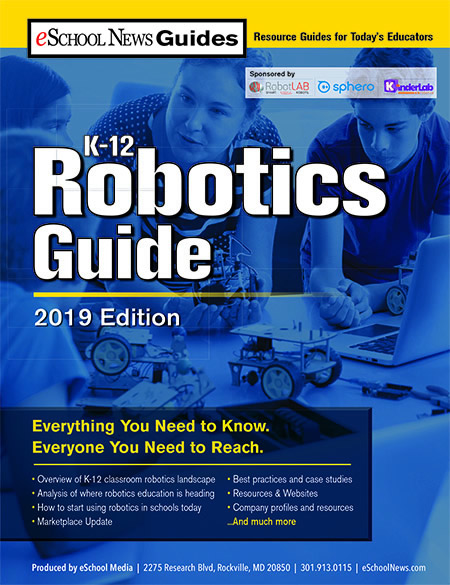While some English learners and students of color may be striving to attain minimal academic competency, others are likely to be high-ability or gifted/talented students who are not receiving appropriate support for their needs, and therefore are less engaged and have lower levels of participation in programs suitable for them.
English learners and students of color are persistently underrepresented in advanced classes and in programs for students identified as gifted, according to research presented during a recent edWebinar led by professors Julia Nyberg and Misty LaCour of Purdue University Global. Dr. Nyberg and Dr. LaCour then identified effective ways to improve the number of students participating and the extent of their engagement, through the use of outreach programs and classroom strategies.
Related Content:
eSchool News Robotics Guide
The eSchool News Robotics Guide is here! It features strategies to help you effectively integrate robotics into instruction, along with tips to find the right robotics resources to successfully teach key concepts. A new eSchool News Guide will launch each month–don’t miss a single one!
The underrepresentation of English learners and students of color may be due to a lack of technical measures that can be used to identify high-ability and gifted students, or the incomplete application of such measures across diverse student populations.
Related content: SEL is critical for English learners
Whatever the cause, the lack of participation is not just an equity and social justice issue, it’s also an economic issue because our society’s full range of creative and critical thinkers are needed to fuel the growth of local economies and maintain our global competitiveness.
Engaging high-ability students and their families
To better respond to the needs of underrepresented groups, Dr. Nyberg recommended an approach that was field tested in San Bernardino and other counties in southern California that have large populations of English learners and students of color.
During the development phase of the project, an outreach plan was created in order to build culturally responsive partnerships, including a family engagement team, and provide a basis for ongoing collaboration. The researchers and local educators then hosted a mini workshop and conference series that included students and family members.
Based in part on results of an initial survey sent out prior to the events, the events were held during school hours to avoid the need to provide care for other children, and translators were present to assist speakers of Spanish, Korean, and other languages. There was a strong turn out and continued participation by family members, and the researchers and local educators continued to use reflection rubrics and participant surveys to guide the project.
One of the key findings identified and ranked concerns of participants, revealing that motivating the high-ability students was the top concern, followed by communication with the students, and then challenging those students.
Using effective classroom strategies
Based on these results, Dr. LaCour outlined a series of classroom strategies that can be used to meet the needs of high-ability English learners and students of color, as well as other students.
In regard to motivation, Dr. LaCour recommended working with students to identify areas of interest and then including the students in setting goals for related projects. She also suggested having students and family members do presentations as experts on their culture and language, which can include not just providing information but also the sharing of things such as food and music.
To improve and maintain communication, creating a positive and emotionally safe classroom environment is a top priority. There should also be multiple means of communication, including written, oral, and artistic communication, and the use of techniques such as dialogic reading in which students respond to an initial question or prompt, and then there is further dialogue and expansion of the responses as well as evaluation.
And to ensure that students’ learning and work remains challenging, Dr. LaCour emphasized the need for educators to go beyond standard lesson plans when necessary, in order to encourage creative and critical thinking. Engaging students in creating their own challenges can also be effective, as can using a tiered learning approach with ELs, so that they receive support for language skill development while remaining challenged in regard to academic content and their other areas of competence.
Through ongoing outreach, collaboration, and the use of effective classroom strategies, educators can improve the performance and participation of high-ability students regardless of their English acquisition level or skin color.
About the presenters
Dr. Julia Nyberg is a professor at Purdue University Global. Dr. Nyberg was a K-6 classroom teacher and professional development expert before entering higher education. Her research focuses on curriculum and instructional design for diverse gifted and high ability students. She speaks at state and national conferences and provides demonstration lessons for school districts related to her expertise on curriculum design and differentiated instruction for diverse gifted and high ability students. Dr. Nyberg serves on professional organizations, including as a board member for the California Association for the Gifted.
Dr. Misty LaCour is a professor at Purdue University Global. She has served in higher education through various teaching and leadership roles. Previous to entering higher education, Dr. LaCour was an elementary and middle school classroom teacher. Her primary research area focuses on best practices to meet the needs of at-risk, diverse learners in the P-12 classroom. She is active in professional organizations by serving in leadership roles at the state and national levels.
Join the community
Helping ELL/ESL Students Succeed is a free professional learning community on edWeb.net that focuses on supporting ELL/ESL students to improve their academic achievement and English language learning.
This edWeb broadcast was sponsored by VIPKid. The recording of the edWebinar can be viewed by anyone here.
- Empowering girls with STEM education to build tomorrow’s tech industry - April 29, 2024
- How a small school in Sierra Leone uses remote learning to offer high school - April 29, 2024
- 4 ways to encourage play in education - April 25, 2024


